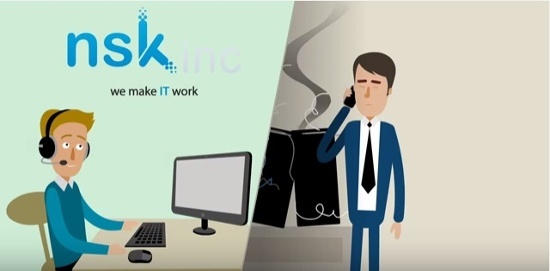CompTIA research finds that the drivers for leveraging managed IT services can range from the desire to reduce costs to the belief that an outside party can provide top-notch security, uptime and general peace of mind. Using data presented in this CompTIA guide as reference, we'll break down these top drivers for you!
- Improved security
- Proactive approach to IT problems
- Better uptime
- Gain access to newer technologies
- Cost savings over in-house IT
- Peace of mind
- Free internal staff for strategic work
- Tap into cloud solutions
- Lack of internal IT
- Handle remote office IT
Let's take a deeper look into the top five drivers:
1. Enhanced Security
Laptops, desktops, smartphones, applications, tablets, servers, operating systems, browsers, wearable technology and the like all store and transmit data and thus require the strictest security measures. Small businesses need Managed Services Providers (MSPs) out of fear of becoming the next headline in a high-profile data breach or data loss incident. Very seldom do they need to be reminded about the most notorious examples highlighted in the media and fallout.
With a HIPAA compliant IT solutions provider, one who understands HIPAA regulations and how to supplement them with additional managed security protocol, policies and procedures. The Anthem data breach, which implicated one-third of Americans and compromised the medical data of nearly 100 million individuals. As CompTIA's study finds, security and data protection resonates with a small business. Along these lines, compliance is becoming even more of an outsourced IT adoption driver for business owners, especially with regard to PCI security standards, since many businesses offer e-commerce on their websites.
2. Proactive Approach to IT Problems
Small Businesses are looking for the benefit of managed IT services because it is so important. Small Businesses don't want to have to worry about their daily IT operations. They don't want to have to second-guess the reliability and speediness of their network connection. Similarly, they don't want to have to worry about what the state their IT environment will be when they commute in to work each morning. They choose to work with an IT Managed Services Provider (MSP) because they can provide 24x7x365 coverage. Services like Remote Monitoring and Management (RMM) and the security suite that MSPs offer to detect potential disturbances and  vulnerabilities, allowing them to resolve problems before they develop into more critical threats. An IT managed services provider offers fully managed IT support, and is often able to troubleshoot and re-mediate glitches or bugs before a business is any the wiser. A CEO just doesn’t have the time to verify that the backups for his business have actually worked? IT Service Providers already know that data management is a top IT challenge for Small Businesses. So, in working with the right MSP, key executives can take advantage of proactive Back Up Disaster Recovery (BDR) solutions that offer business continuity by combining RMM intelligence with regular, encrypted backups, cloud computing capabilities and IT virtualization.
vulnerabilities, allowing them to resolve problems before they develop into more critical threats. An IT managed services provider offers fully managed IT support, and is often able to troubleshoot and re-mediate glitches or bugs before a business is any the wiser. A CEO just doesn’t have the time to verify that the backups for his business have actually worked? IT Service Providers already know that data management is a top IT challenge for Small Businesses. So, in working with the right MSP, key executives can take advantage of proactive Back Up Disaster Recovery (BDR) solutions that offer business continuity by combining RMM intelligence with regular, encrypted backups, cloud computing capabilities and IT virtualization.
3. Maximizing Uptime
Today, every business needs to be completely prepared for emergencies such as power failures, security breaches, data loss or other disasters that could damage their accounts and credibility. There’s a definite need for constant up-time and business continuity, and by including BDR as part of their managed services the MSP becomes a turnkey solution provider that ensures the safety of small businesses precious data in any disaster situation. Trusted MSPs, help clients and prospects identify and prevent the kind of damaging impact a downtime event could have on their business. To avoid long-term downtime, SMBs can leverage an MSP that will keep their IT systems running smoothly and efficiently, so they can focus on their core business operations. By outsourcing basic IT functions, businesses will be able to maximize uptime and allocate their internal staff resources to focus on strategic projects and business activities that will help grow their business.
4. Access to New Technologies
Often, a small business has an over-burdened IT staff with an employee(s) who may lack the skills and training for certain tasks or can't handle the whole of the company's network on their own. In response, these companies recognize the value of working with an outside technical support team. Not only does IT outsourcing help with having an extra team of IT experts able to troubleshoot and remediate issues that arise, clients benefit from having access to the latest technology and business-grade solutions that maintain uptime and profitability, such as remote monitoring and management (RMM), backup and disaster recovery (BDR) and cloud  computing. Investing in these tools increases the reliability of organizations' IT infrastructure. Investing in the IT managed services business model tackles existing labor constraints and prevents internal IT departments from always having to play catch-up. By working with an MSP, business can also receive a virtual CIO (vCIO) in addition to the business-grade technology for their IT infrastructure. A vCIO is able to understand and manage the evolving technology landscape – allowing your clients to better plan for the long term and scale their business.
computing. Investing in these tools increases the reliability of organizations' IT infrastructure. Investing in the IT managed services business model tackles existing labor constraints and prevents internal IT departments from always having to play catch-up. By working with an MSP, business can also receive a virtual CIO (vCIO) in addition to the business-grade technology for their IT infrastructure. A vCIO is able to understand and manage the evolving technology landscape – allowing your clients to better plan for the long term and scale their business.
5. ROI/Cost Savings
One of the biggest business values of having IT managed services is greater cost savings. IT budgets consist of many items: hardware costs, software and network infrastructure costs and maintenance costs, to name a few. Also, the cost of labor is significant for any business, but especially for small business who rely on managed services providers. For some companies the need to work with an MSP actually reduces the size of its IT department because the cost of paying their current staff is far too high. It could also be the case that the company has no dedicated IT team and employees are forced to compensate by performing technical tasks that are outside of their core area of expertise, slowing productivity and preventing the business from being able to grow. With the managed services business model, customers are able to more easily predict their IT costs on a month-to-month basis. Clearly break the ROI of managed services down for them, and explain how freeing up more staff time to devote to higher value projects they're properly equipped to manage increases productivity overall.
Sending out a thank you to www.continuum.net.com for help with this article

